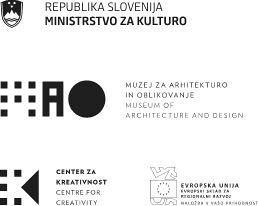26th Biennial of Design
November 14, 2019–February 9, 2020
Museum of Architecture and Design (MAO), Ljubljana
Rusjanov trg 7
SI- 1000 Ljubljana
Slovenia
Hours: Tuesday–Sunday 10am–6pm
T +386 1 548 42 70
mao@mao.si
The official opening of BIO 26| Common Knowledge took place on November 14 at the Ajdovščina passage in Ljubljana, Slovenia. The event kicked off the 26th Biennial of Design, which is open to visitors through February 9, 2020. Guests were welcomed by MAO director Matevž Čelik, curator Thomas Geisler, and assistant curator Aline Lara Rezende.
“After months of hard work, I’m very proud to present BIO 26| Common Knowledge to the world. I hope the exhibitions and accompanying events will provoke and inspire visitors to form new ideas and insights about the global information crisis. By displaying different point of views, exploring new concepts, and inviting local and international partners, we’re shedding a light on all aspects of this global theme,” curator Thomas Geisler said after the opening.
The 26th Biennial of Design deals with the information crisis and grapples with the challenges of traditional institutions of knowledge, which now find themselves in a dramatically changed context. Existing in an era of fascinating technological progress and an incomprehensible amount of information, which often comes from unconfirmed sources, BIO 26 shows how design can help create open institutions and has partnered with six institutions central to knowledge production and dissemination, including a museum, a library, a university, and a newspaper, but also a botanical garden and a retirement home.
BIO 26| Open Knowledge presents six major commissioned experimental projects by multidisciplinary teams selected through a designathon process. The six winning teams have been guided by a professional and international team of Design Mentors, namely Commonplace, Paolo Patelli, Apolonija Šušteršič, Kathrina Dankl, Futurefarmers, and Bureau d’études. The six Design Mentors are also presenting their own work(s) in the central exhibition at MAO which represents a central exhibition of historic and contemporary projects.
Commonplace Studio’s Curiosity Cabinet #1 is the first cabinet in a series that appropriates the structure of historical curiosity cabinets of the sixteenth century in a contemporary context. They are also included in the exhibition with Commonplace books, compilations of knowledge that have started in antiquity by collecting information in books. Paolo Patelli’s Teaching Lies teaches us to scrutinize post-factual conditions that infiltrate politics, design, art, the media, and ultimately our daily lives. The Underground Discussion Club by Apolonija Sustersic is a discursive platform that has the ambition to stimulate discussions around topics that require public attention at this moment. Futurefarmers are represented with their Seed Journey and Soil Procession projects, Kathrina Dankl is presenting Memento, a prototype that could improve lives of people with dementia, and her works for Meet magazine. Bureau d’Etudes are featured with two infographics: The 8th Sphere and infowar/psychic war.
BIO 26| Common Knowledge also includes prominent works of important historic projects by well-known names such as Otto Neurath, H.G. Wells, Marshall McLuhan, Viktor Papanek, Otl Aicher, Ken Isaacs. When it comes to contemporary projects, the exhibition puts on display works by Superflux, Dunne & Raby, Forensic Architecture, Neri Oxman, acclaimed infographist Jaime Serra, editorial designer Mark Porter and the intrinsic Institute of Patent Infringement. The 26th Biennial of Design is proud to collaborate with international partners, such as ZKM | Center for Art and Media Karlsruhe and MU artspace Eindhoven. Both are showing exciting exhibitions on the framework of the biennial. The pharmaceutical company Lek is contributing the installation It’s all connected in collaboration with their Bohuslav Lavička Pharmaceutical and Medical Collection.
The wide program of associated projects BIO 26| Shared Knowledge offers another perspective on the main theme through connecting the questions discussed by BIO 26 with a diverse array of exhibitions and workshops, linking several locations and partners throughout the city centre with the downtown base at the Ajdovščina Underpass. Visitors can enjoy the site-specific wooden installation [Home at Arsenale], a curated and temporary with 250 books sharing its knowledge during BIO 26 and addressing the notions of home and dwelling. Besides this, they can explore the Reconstrained Future exhibition which is questioning the existence of a common future and if so—to whom that future belongs.
e-flux Architecture is collaborating with BIO26, contributing a series of archival essays to the biennial’s catalogue and commissioning five new essays that respond to canonical texts from the past 200 years that frame the curatorial project.
Visit BIO 26| Common Knowledge: delve into the world of information and be amazed by the commissioned projects, central exhibition, and various accompanying events. The Biennial of Design is open through February 9, 2020.



